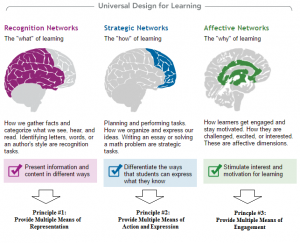Jessica Bennett Attended the Summer Accessibility Institute
 This four day intensive workshop series, conducted by the Faculty Center for Teaching and Learning at MSU, focused on accessibility in teaching design, specifically universal design for learning (UDL). There are three main principles of universal design: multiple means of representation, multiple means of action and expression, and multiple means of engagement. All of these principles add up to a course that appeals to learners all over the spectrum of physical, and mental abilities. In an ideal scenario, courses are created using UDL, and this significantly lessens the number of accommodations needed for students of varying abilities. For example, if a teacher makes sure all documents used in the course are made accessible using Microsoft Word (correct headings/styles), then screen reader software is able to read the document easily, and in a way that makes sense to the learner. This is a very simple thing to adjust, and having so done prior to a course beginning makes it that much easier for everyone. One of the things that stood out, that the library can do, falls into the multiple means of representation section. Creating library signs that are free of jargon and promote understanding across languages may seem like a small thing, but can positively impact a learners’ experience in the library building. Another point of discussion that popped up during the workshop centered around textbooks, and learning materials. As we look into various options and uses with OER (Open Educational Resources), we need to seriously question the accessibility of the materials- are they screen readable? Do they allow annotations? If it is a PDF, has it been saved correctly for OCR (Optical Character Recognition)? The library is well-positioned to advocate for these things, which ultimately benefit all learners.
This four day intensive workshop series, conducted by the Faculty Center for Teaching and Learning at MSU, focused on accessibility in teaching design, specifically universal design for learning (UDL). There are three main principles of universal design: multiple means of representation, multiple means of action and expression, and multiple means of engagement. All of these principles add up to a course that appeals to learners all over the spectrum of physical, and mental abilities. In an ideal scenario, courses are created using UDL, and this significantly lessens the number of accommodations needed for students of varying abilities. For example, if a teacher makes sure all documents used in the course are made accessible using Microsoft Word (correct headings/styles), then screen reader software is able to read the document easily, and in a way that makes sense to the learner. This is a very simple thing to adjust, and having so done prior to a course beginning makes it that much easier for everyone. One of the things that stood out, that the library can do, falls into the multiple means of representation section. Creating library signs that are free of jargon and promote understanding across languages may seem like a small thing, but can positively impact a learners’ experience in the library building. Another point of discussion that popped up during the workshop centered around textbooks, and learning materials. As we look into various options and uses with OER (Open Educational Resources), we need to seriously question the accessibility of the materials- are they screen readable? Do they allow annotations? If it is a PDF, has it been saved correctly for OCR (Optical Character Recognition)? The library is well-positioned to advocate for these things, which ultimately benefit all learners.